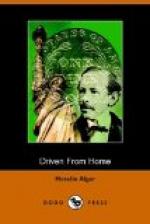“I didn’t think of it,” said the messenger. “Maria was so excited, and insisted that the boy murdered him.”
“What boy?”
Carl was pointed out.
“That boy? What nonsense!” exclaimed Dr. Park. “Why, it would be more than you or I could do to overpower and hang a man weighing one hundred and seventy-five pounds.”
“That’s what I thought, but Maria seemed crazed like.”
“I tell you he did it! Are you going to let him go, the red-handed murderer?”
“Loose the cord, and I will question the boy,” said Dr. Park, with an air of authority.
Carl breathed a sigh of relief, when, freed from his bonds, he stood upright.
“I’ll tell you all I know,” he said, “but it won’t throw any light upon the death.”
Dr. Park listened attentively, and asked one or two questions.
“Did you hear any noise when you were sitting at the table?” he inquired.
“No, sir.”
“Was the door closed?”
“Yes, sir.”
“That of itself would probably prevent your hearing anything. Mrs. Brown, at what hour did you leave the house?”
“At ten minutes of twelve.”
“It is now five minutes of one. The deed must have been committed just after you left the house. Had you noticed anything out of the way in your—husband’s manner?”
“No, sir, not much. He was always a silent man.”
“Had anything happened to disturb him?”
“He got a letter this morning. I don’t know what was in it.”
“We had better search for it.”
The body was taken down and laid on the bed. Dr. Park searched the pockets, and found a half sheet of note paper, on which these lines were written:
“Maria:—I have made up my mind I can ive no longer. I have made a terrible discovery. When I married you, I thought my first wife, who deserted me four years ago, dead. I learn by a letter received this morning that she is still living in a town of Illinois. The only thing I can do is to free you both from my presence. When you come back from the store you will find me cold and dead. The little that I leave behind I give to you. If my first wife should come here, as she threatens, you can tell her so. Good-by.
“William.”
The reading of this letter made a sensation. Mrs. Brown went into hysterics, and there was a scene of confusion.
“Do you think I can go?” Carl asked Dr. Park.
“Yes. There is nothing to connect you with the sad event.”
Carl gladly left the cottage, and it was only when he was a mile on his way that he remembered that he had not paid for his dinner, after all.
CHAPTER IX.
A plausible stranger.
Three days later found Carl still on his travels. It was his custom to obtain his meals at a cheap hotel, or, if none were met with, at a farmhouse, and to secure lodgings where he could, and on as favorable terms as possible. He realized the need of economy, and felt that he was practicing it. He had changed his ten-dollar bill the first day, for a five and several ones. These last were now spent, and the five-dollar bill alone remained to him. He had earned nothing, though everywhere he had been on the lookout for a job.




